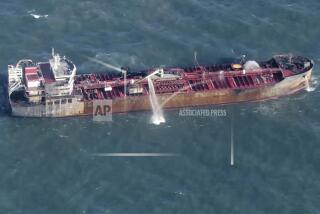Russian Freighter to Offload Oil in Oman
- Share via
MUSCAT, Oman — A Russian tanker that allegedly was smuggling Iraqi oil in violation of U.N. sanctions was waiting Monday to offload its cargo in Oman despite strong objections from Moscow to its seizure by a U.S. cruiser.
The tanker, Volga-Neft-147, remained anchored less than a mile from Oman’s Qaboos port. Alexander Nazarov, a diplomat at the Russian Embassy in Muscat, said it will begin offloading Tuesday. The Russian Foreign Ministry said the cargo would be put in storage in Oman.
The tanker was seized Wednesday in the Gulf of Oman off the United Arab Emirates on suspicion it was carrying Iraqi oil. The cruiser USS Monterey stopped it, and armed sailors boarded the tanker after it failed to respond to routine queries.
U.S. Defense Secretary William Cohen said Sunday that tests confirmed the tanker was carrying Iraqi crude, in violation of U.N. sanctions that bar Baghdad from unilateral oil sales. Iraq is allowed to sell oil only under U.N. financial controls, with proceeds going to fund humanitarian programs and Gulf War reparations.
The tanker, which is carrying 4,000 tons of oil, was handed over to Oman on Monday by the U.S. Navy.
The Russian Foreign Ministry has repeatedly denied that the Volga-Neft-147 was carrying Iraqi crude, saying it was actually carrying fuel oil from Iran to ports in the United Arab Emirates. It said Russia will carry out its own investigation, and its U.N. ambassador called for independent tests to determine the oil’s source.
“There is no confidence in the accuracy of the analysis results” because the tests were conducted in the absence of Russian experts, said Stanislav Bulgakov, the shipping director of the Transpetro-Volga company, according to the ITAR-Tass news agency.
Transpetro-Volga Director Vladimir Kuzin said the ship had been chartered by a British firm, which should ultimately be responsible for the cargo’s source, ITAR-Tass reported.
“The owner of the cargo provided the necessary documents, . . . and the documents stated that the origin of the cargo was Iranian, not Iraqi,” he said.
The U.S. Navy said a gas analysis confirmed the oil’s origin. It also said that the ship’s first officer is an Iraqi national and that documents found in his state room backed up the analysis data.
“Additionally, the ship’s navigation computer and handwritten navigational chart markings established a clear transit from Iraq through Iranian territorial waters to the United Arab Emirates,” the Navy said.
In Moscow, Russian Deputy Foreign Minister Vasily Sredin told ITAR-Tass that the ship was ready to unload and that the U.S. Navy personnel--including at least two SEALs seen on board with masks and machine guns--have left the vessel.
Under rules of the embargo, the ship and its cargo may be sold by the host nation. But Russian U.N. Ambassador Sergey Lavrov said Monday that the U.S., Oman and Russia have agreed that the tanker and its crew will be released.
Lavrov said Moscow wants to know why the U.S. Navy held the Russian crew incommunicado.
“We have many questions on this entire episode,” he said.
Iraq is banned from most international commerce but is allowed to export oil to buy food, medicine and other essentials for its people and spare parts for its oil industry.
The Clinton administration has insisted on full Iraqi compliance with U.N. Security Council resolutions, including a requirement that Iraq not possess weapons of mass destruction, before the embargo is lifted. Russia has long supported steps that would lead to lifting the embargo.
More to Read
Sign up for Essential California
The most important California stories and recommendations in your inbox every morning.
You may occasionally receive promotional content from the Los Angeles Times.













